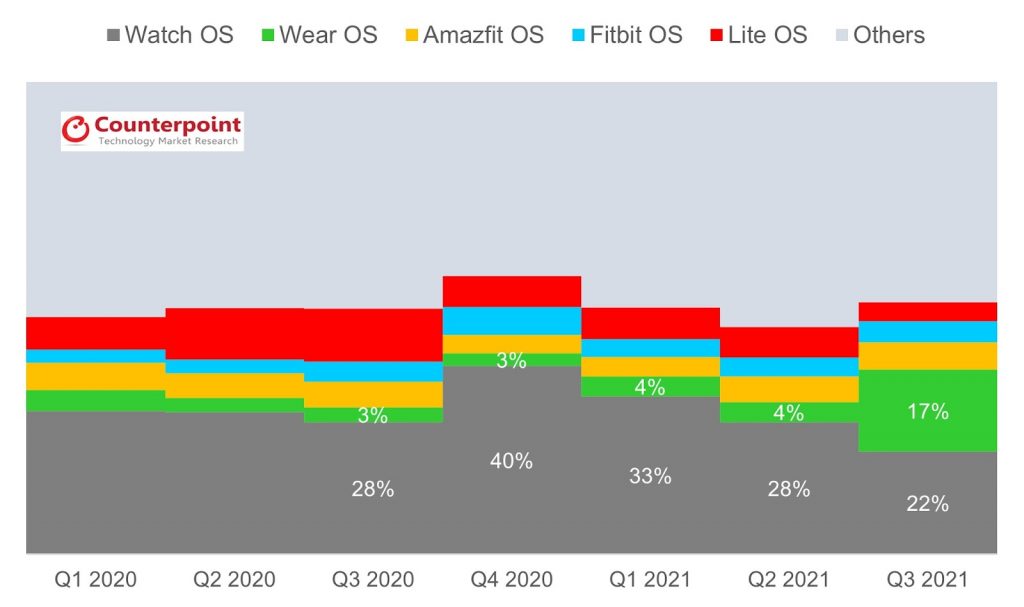
WearOS got the booster shot it needed from the launch of Samsung’s Galaxy Watch 4.
Google’s smartwatch operating system has struggled for years to gain traction against not only the might of Apple’s WatchOS but also rival platforms from the likes of Huawei, Fitbit, Amazfit, Garmin, and even Samsung.
Samsung was an early supporter of WearOS but eventually gave up on the platform and switched to its own Tizen-based alternative. Earlier this year, a surprise joint announcement from Google and Samsung revealed the pair would be joining forces again to fix WearOS and finally bring some real competition to Apple.
While it’ll be some time before we really see the fruits of that relationship, Samsung is switching back to using WearOS for its smartwatches beginning with the Galaxy Watch 4.
According to Counterpoint Research, Samsung’s new smartwatch made up almost 60 percent of smartwatch shipments in North America and Europe during Q3 2021.
In a press release, Counterpoint Research explained:
“Thanks to the launch of the Galaxy Watch 4 series, Samsung achieved its highest quarterly shipments, narrowing the gap with Apple and reclaiming second place from Huawei.
From this smartwatch series, Samsung has expanded its app ecosystem by using Android-based Wear OS instead of its Tizen.
The brand has also broadened users’ range of choice by launching two models – basic and classic. The newly added body composition feature has also fetched a good response.”
Meanwhile, Apple’s marketshare dropped significantly in Q3 due to a delayed launch of the Apple Watch Series 7. Apple retained the number one spot in Q3 but its share fell 10 percent year-on-year.
Smartwatch Shipment Share by OS, Q1 2020-Q3 2021

(Source: Global Smartwatch Model Tracker, Q3 2021)
Sujeong Lim, Senior Analyst at Counterpoint Research, said:
“To further increase its market share, Samsung is expected to launch affordable models within 2-3 years to target the fast-growing Asian market. One-third of smartwatches sold in Q3 2021 were priced under $100.
In Q3 2021, there was also a significant change in OS market shares. Thanks to Samsung, which started using Wear OS with the Galaxy Watch 4, Google saw good growth in the wearable OS market.
In terms of OS, the smartwatch market is fragmented as many OEMs still use proprietary OS or RTOS. But with third-party app support becoming important for users, the situation is expected to change steadily.”
While it’s hard to think of any tech brand that commands the same loyal fanbase as Apple does, Samsung is among the closest. Samsung brings its fans to WearOS along with hardware expertise all the way down to the chip.
The reputation that WearOS has gained of being a slow operating system with poor power efficiency could finally be changing.
Ms Lim added: “Google has maintained a dominant share in the smartphone market with Android OS, but so far has not achieved much in the wearable market. This is because Google controlled smartwatch OEMs from customising the UI, and it was not chosen by them due to its lower power efficiency and slow response time.
However, the partnership with Samsung from this year has gained a foothold for Google to expand its presence in the wearable OS market and seems ready to transform into a more open wearable platform from this time forward.”
(Header Photo by SpaceX on Unsplash)

Looking to revamp your digital transformation strategy? Learn more about the Digital Transformation Week event taking place in Amsterdam on 23-24 November 2021 and discover key strategies for making your digital efforts a success.






